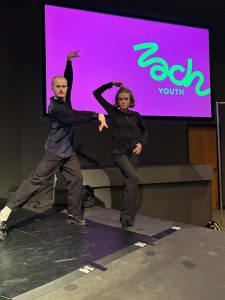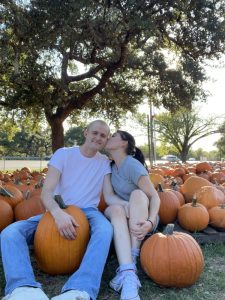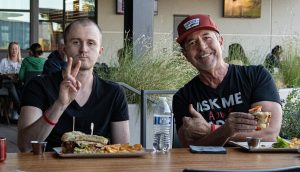Matt’s first symptom was Sudden Cardiac Arrest; his next act is resilience, as he learns to live – and dance – safely with ARVC.
By: The SADS Foundation and Matt K.
Published October 24, 2025 | 15 min read
“You will be able to push the boulder over the top of the mountain. You don’t have to experience this journey alone.”
— Matt
In October of 2022, Matt was taking a dinner break during a World of Dance rehearsal in New York City when he experienced sudden cardiac arrest (SCA). It was his first symptom of an underlying heart condition.
A friend started CPR, and nearly 15 minutes passed before EMS arrived. Matt was shocked 4 times with an AED before being transported to the ER. An ICD was implanted a few days later, after he came out of a coma. There were many weeks of rehabilitation for Matt, due to an anoxic brain injury, which continued following his return to Austin, TX. His mom, Christy, connected with the SADS Foundation after Matt experienced an inappropriate ICD shock that December. “The SADS Foundation sent me questions to take to his doctor,” says Christy.
In January 2023, genetic testing revealed that Matt had ARVC (PKP2 mutation). “I lost my home, career, and finances in New York City and moved back with family in Texas,” says Matt. “But with my family’s help – physically and emotionally – I’ve been able to regain humanity, working and seeking normalcy again. It’s been a rough journey, but developing a mental capacity that can handle the chaos of this disease has been the most beneficial.”
“We finally felt understood”
The four months between Matt’s SCA and his ARVC diagnosis were especially difficult for him and his family, who felt lost and uncertain about what to do next. Matt and his parents found critical support through the SADS Foundation.
“One of the biggest things I remember from our journey was our initial conversations with the SADS Family Support Director, Genevie,” says Christy. “When we first talked with her, Matt was in a very dark place – the SCA was very hard on him mentally and emotionally. When Matt talked to Genevie, he finally felt understood.”
For Matt, one of the biggest adjustments – and challenges – after his diagnosis has been restricting his exercise. “After diagnosis I had to give up my entire identity and career as a dancer and dance instructor, for the sake of not increasing my symptoms and worsening my heart disease,” he says.
“After diagnosis I had to give up my entire identity and career as a dancer and dance instructor, for the sake of not increasing my symptoms and worsening my heart disease.”
 Yet over the past couple of years, Matt has regained an immense amount of strength and endurance as a dancer and musical theater artist, now working at Zach Theatre as a performer, choreographer, and educator. He carefully balances his busy days with rest and recovery while still performing at a high level – though not as intensely as before.
Yet over the past couple of years, Matt has regained an immense amount of strength and endurance as a dancer and musical theater artist, now working at Zach Theatre as a performer, choreographer, and educator. He carefully balances his busy days with rest and recovery while still performing at a high level – though not as intensely as before.
Matt has also begun taking flecainide as the primary medication to help manage his condition. Alongside medical treatment, he exercises daily – focusing on balance, not pushing limits. “Physical rehabilitation and rest are just as important as movement,” he says.
Real help for real life. From the first scary weeks to long-term coping, our Family Support team offers 1:1 guidance, practical tools (doctor question lists, school letters), and a compassionate ear for patients, parents, and partners. We’ll meet you where you are – emotionally and medically – and walk the road with you. Connect with us 👉
“You don’t have to experience this journey alone”
Getting back into the community has been one of the most effective ways for Matt to cope emotionally. “Though many don’t fully understand how daunting this disease can be, people care – humans put sympathy before judgment,” says Matt. “The kindness, connection, and generosity of my cohorts and coworkers have been the foundation of my emotional and mental recovery.”
Reconnecting with family has also been central to Matt’s healing. Weekly family nights have become a new and cherished tradition. “I’ve never felt closer to my family,” he says. “I wouldn’t be here without them.”
Christy adds, “The SADS Foundation continues to be such a brilliant resource for our family’s journey with ARVC, as Matt’s sister and father both tested positive for the PKP2 gene mutation. They’ve guided us to Johns Hopkins, updated us with important information and research, and connected us with people who can make a difference for the future of those with genetic heart diseases.”
Talk to someone who truly gets it. From physician referrals to peer-to-peer support, and support groups led by those who’ve walked the same road, the SADS Foundation is here for you. Connect with us 👉
“I hope for a future where I can live without fear”
Both Matt and his family hope for new and better treatments for ARVC that go beyond the limitations of current therapies. “When I go to work, I still carry that underlying feeling that something could happen,” Matt says. “No one should live that way. I’m grateful for how far medicine has come – and for the safety of my ICD – but I hope for a future where I can live fully without fear.”
“The SADS Foundation has guided us to Johns Hopkins, updated us with important information and research, and connected us with people who can make a difference for the future of those with genetic heart diseases.”

 Matt offers encouragement to others newly diagnosed with ARVC or other genetic arrhythmia conditions:
Matt offers encouragement to others newly diagnosed with ARVC or other genetic arrhythmia conditions:
“You will be able to push the boulder over the top of the mountain. It feels endless, disastrous, and hopeless at times – but you are strong enough to overcome it, and you don’t have to experience this journey alone.”
Looking ahead, Matt hopes those with ARVC will one day feel safe being active again. “It’s inspiring to see people running marathons, working out, even taking gentle walks,” he says. “I’m back in rehearsals – dancing hard, staying hydrated, breathing, and pacing myself. You can do it too! Listen to your cardiologist, trust your heart, and remember – even small steps forward are still steps forward.”
👉 Want to connect others with ARVC? Learn more here →
Need help now? Connect with our Family Support Team for referrals, resources, and community.
Contact | Get Support | Donate
